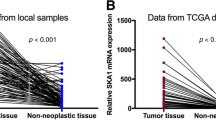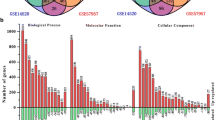Abstract
Background
Through data mining the Stanford Microarray Database, the CKS1B transcript was found to be frequently upregulated in hepatocellular carcinomas (HCCs) with low alpha-fetal protein (AFP) expression. Together with SKP2, CKS1B is known to implicate p27Kip1 protein turnover promoting cell-cycle progression.
Methods
CKS1B, p27Kip1, and SKP2 were immunostained in 75 HCCs and correlated with clinicopathological features, local recurrence-free survival (LRFS), and overall survival (OS). Silencing of CKS1B and SKP2 with interference short-hairpin RNA (shRNA) was performed in SK-Hep1 and Hep-3B cell lines.
Results
Immunohistochemically, increased CKS1B and SKP2, and attenuated p27Kip1 were all associated with tumor multiplicity (P < 0.05) and increasing American Joint Committee on Cancer (AJCC) stage (P < 0.05). Overexpression of CKS1B significantly correlated with advanced Okuda stages (P = 0.048) and SKP2 overexpression (P = 0.047). Neither CKS1B nor SKP2 was inversely related to p27Kip1, which was reinforced by no alteration in p27Kip1 abundance in HCC-derived cells with CKS1B or SKP2 silencing. Both CKS1B overexpression (P = 0.0011 and P = 0.0017) and p27Kip1 attenuation (P = 0.0079 and P = 0.0085) were predictive of OS and LRFS, respectively, while SKP2 overexpression was associated with worse OS alone (P = 0.0043). Combined assessment of CKS1B and p27Kip1 was able to robustly distinguish three prognostically different groups (P < 0.0001). In multivariate comparison, CKS1B overexpression represented the strongest independent adverse prognosticator [OS, P = 0.0235, hazard ratio (HR): 4.193; LRFS, P = 0.0204, HR: 4.262], followed by p27Kip1 attenuation (OS, P = 0.0320, HR: 2.553; LRFS, P = 0.0262, HR: 2.533).
Conclusions
CKS1B protein overexpression in HCCs is implicated in clinical aggressiveness but not in p27Kip1 turnover, implying presence of p27Kip1-independent oncogenic attributes. The combined assessment of CKS1B and p27Kip1 immunoexpressions effectively risk-stratifies HCCs with different prognoses, which may aid in the management of this deadly malignancy.






Similar content being viewed by others
References
Chen X, Cheung ST, So S, et al. Gene expression patterns in human liver cancers. Mol Biol Cell. 2002;13:1929–39.
Egan EA, Solomon MJ. Cyclin-stimulated binding of Cks proteins to cyclin-dependent kinases. Mol Cell Biol. 1998;18:3659–67.
Ganoth D, Bornstein G, Ko TK, et al. The cell-cycle regulatory protein Cks1 is required for SCF(Skp2)-mediated ubiquitinylation of p27. Nat Cell Biol. 2001;3:321–4.
Urbanowicz-Kachnowicz I, Baghdassarian N, Nakache C, et al. ckshs expression is linked to cell proliferation in normal and malignant human lymphoid cells. Int J Cancer. 1999;82:98–104.
Hu Y, Sun H, Drake J, et al. From mice to humans: identification of commonly deregulated genes in mammary cancer via comparative SAGE studies. Cancer Res. 2004;64:7748–55.
Spruck C, Strohmaier H, Watson M, et al. A CDK-independent function of mammalian Cks1: targeting of SCF(Skp2) to the CDK inhibitor p27Kip1. Mol Cell. 2001;7:639–50.
Bloom J, Pagano M. Deregulated degradation of the cdk inhibitor p27 and malignant transformation. Semin Cancer Biol. 2003;13:41–7.
Ito Y, Matsuura N, Sakon M, et al. Expression and prognostic roles of the G1-S modulators in hepatocellular carcinoma: p27 independently predicts the recurrence. Hepatology. 1999;30:90–9.
Armengol C, Boix L, Bachs O, et al. p27(Kip1) is an independent predictor of recurrence after surgical resection in patients with small hepatocellular carcinoma. J Hepatol. 2003;38:591–7.
Fiorentino M, Altimari A, D’Errico A, et al. Acquired expression of p27 is a favorable prognostic indicator in patients with hepatocellular carcinoma. Clin Cancer Res. 2000;6:3966–72.
Sun D, Ren H, Oertel M, Sellers RS, Zhu L. Loss of p27Kip1 enhances tumor progression n chronic hepatocyte injury-induced liver tumorigenesis with widely ranging effects on Cdk2 or Cdc2 activation. Carcinogenesis. 2007;28:1859–66.
Tannapfel A, Grund D, Katalinic A, et al. Decreased expression of p27 protein is associated with advanced tumor stage in hepatocellular carcinoma. Int J Cancer. 2000;89:350–5.
Sitry D, Seeliger MA, Ko TK, et al. Three different binding sites of Cks1 are required for p27-ubiquitin ligation. J Biol Chem. 2002;277:42233–40.
Ouellet V, Guyot MC, Le Page C, et al. Tissue array analysis of expression microarray candidates identifies markers associated with tumor grade and outcome in serous epithelial ovarian cancer. Int J Cancer. 2006;119:599–607.
Zhan F, Colla S, Wu X, et al. CKS1B, overexpressed in aggressive disease, regulates multiple myeloma growth and survival through SKP2- and p27Kip1-dependent and -independent mechanisms. Blood. 2007;109:4995–5001.
Chiappetta G, De Marco C, Quintiero A, et al. Overexpression of the S-phase kinase-associated protein 2 in thyroid cancer. Endocr Relat Cancer. 2007;14:405–20.
Hershko DD, Shapira M. Prognostic role of p27Kip1 deregulation in colorectal cancer. Cancer. 2006;107:668–75.
Kawakami K, Enokida H, Tachiwada T, Nishiyama K, Seki N, Nakagawa M. Increased SKP2 and CKS1 gene expression contributes to the progression of human urothelial carcinoma. J Urol. 2007;178:301–7.
Kitajima S, Kudo Y, Ogawa I, et al. Role of Cks1 overexpression in oral squamous cell carcinomas: cooperation with Skp2 in promoting p27 degradation. Am J Pathol. 2004;165:2147–55.
Masuda TA, Inoue H, Nishida K, et al. Cyclin-dependent kinase 1 gene expression is associated with poor prognosis in gastric carcinoma. Clin Cancer Res. 2003;9:5693–8.
Shapira M, Ben-Izhak O, Bishara B, et al. Alterations in the expression of the cell cycle regulatory protein cyclin kinase subunit 1 in colorectal carcinoma. Cancer. 2004;100:1615–21.
Shapira M, Ben-Izhak O, Linn S, Futerman B, Minkov I, Hershko DD. The prognostic impact of the ubiquitin ligase subunits Skp2 and Cks1 in colorectal carcinoma. Cancer. 2005;103:1336–46.
Slotky M, Shapira M, Ben-Izhak O, et al. The expression of the ubiquitin ligase subunit Cks1 in human breast cancer. Breast Cancer Res. 2005;7:R737–44.
Tsai YS, Chang HC, Chuang LY, Hung WC. RNA silencing of Cks1 induced G2/M arrest and apoptosis in human lung cancer cells. IUBMB Life. 2005;57:583–9.
Takanishi DM, Jr., Severino R, Wong LL. The Cancer of the Liver Italian Program (CLIP) score: validation of a new prognostic system for hepatocellular carcinoma. Hawaii Med J. 2007;66:209–12.
Lee CL HK, Chen YL, Shiue YL. Identification of candidate genes in congenital ventricular septal defects with HSA22q11 loss of heterozygosity. Rev Esp Cardiol. 2009;62:263–72.
Shiue YL, Chen LR, Chen CF, et al. Identification of transcripts related to high egg production in the chicken hypothalamus and pituitary gland. Theriogenology. 2006;66:1274–83.
Gollub J, Ball CA, Binkley G, et al. The Stanford Microarray Database: data access and quality assessment tools. Nucleic Acids Res. 2003;31:94–6.
Voiculescu M, Winkler RE, Moscovici M, Neuman MG. Chemotherapies and targeted therapies in advanced hepatocellular carcinoma: from laboratory to clinic. J Gastrointestin Liver Dis. 2008;17:315–22.
Tang H, Tang XY, Liu M,Li X. Targeting alpha-fetoprotein represses the proliferation of hepatoma cells via regulation of the cell cycle. Clin Chim Acta. 2008;394:81–8.
Gurtsevitch VE. Human oncogenic viruses: hepatitis B and hepatitis C viruses and their role in hepatocarcinogenesis. Biochemistry (Mosc). 2008;73:504–13.
Zhou Q, He Q,Liang LJ. Expression of p27, cyclin E and cyclin A in hepatocellular carcinoma and its clinical significance. World J Gastroenterol. 2003;9:2450–4.
Huang HY, Kang HY, Li CF, et al. Skp2 overexpression is highly representative of intrinsic biological aggressiveness and independently associated with poor prognosis in primary localized myxofibrosarcomas. Clin Cancer Res. 2006;12:487–98.
Inui N, Kitagawa K, Miwa S, et al. High expression of Cks1 in human non-small cell lung carcinomas. Biochem Biophys Res Commun. 2003;303:978–84.
Vervoorts J, Luscher B. Post-translational regulation of the tumor suppressor p27(KIP1). Cell Mol Life Sci. 2008;65:3255–64.
Bhatt KV, Hu R, Spofford LS, Aplin AE. Mutant B-RAF signaling and cyclin D1 regulate Cks1/S-phase kinase-associated protein 2-mediated degradation of p27Kip1 in human melanoma cells. Oncogene. 2007;26:1056–66.
Kouvaraki MA, Korapati AL, Rassidakis GZ, et al. Potential role of Jun activation domain-binding protein 1 as a negative regulator of p27kip1 in pancreatic adenocarcinoma. Cancer Res. 2006;66:8581–9.
Westbrook L, Manuvakhova M, Kern FG, Estes NR II, Ramanathan HN, Thottassery JV. Cks1 regulates cdk1 expression: a novel role during mitotic entry in breast cancer cells. Cancer Res. 2007;67:11393–401.
Hu R, Aplin AE. Skp2 regulates G2/M progression in a p53-dependent manner. Mol Biol Cell. 2008;19:4602–10.
Calvisi DF, Pinna F, Meloni F, et al. Dual-specificity phosphatase 1 ubiquitination in extracellular signal-regulated kinase-mediated control of growth in human hepatocellular carcinoma. Cancer Res. 2008;68:4192–200.
Wang IC, Chen YJ, Hughes D, et al. Forkhead box M1 regulates the transcriptional network of genes essential for mitotic progression and genes encoding the SCF (Skp2-Cks1) ubiquitin ligase. Mol Cell Biol. 2005;25:10875–94.
Wang W, Ungermannova D, Chen L, Liu X. Molecular and biochemical characterization of the Skp2-Cks1 binding interface. J Biol Chem. 2004;279:51362–9.
Acknowledgment
Special thanks are extended to Dr. WC Hung (Institute of Biomedical Science, National Sun Yat-sen University, Kaohsiung, Taiwan) for detailed discussion, and for financial support provided by National Science Council (NSC96-2320-B-110-007) to Y.-L. Shiue and partial support from Yuan’s General Hospital (RG06-003) to C.-W. Huang and Chi-Mei Medical Center (CMFHR 9747) to C.-F. Li.
Author information
Authors and Affiliations
Corresponding author
Additional information
Ching-Wen Huang, Ching-Yih Lin, Hsuan-Ying Huang contributed equally to this work.
Rights and permissions
About this article
Cite this article
Huang, CW., Lin, CY., Huang, HY. et al. CKS1B Overexpression Implicates Clinical Aggressiveness of Hepatocellular Carcinomas but Not p27Kip1 Protein Turnover: an Independent Prognosticator with Potential p27Kip1-Independent Oncogenic Attributes?. Ann Surg Oncol 17, 907–922 (2010). https://doi.org/10.1245/s10434-009-0779-8
Received:
Published:
Issue Date:
DOI: https://doi.org/10.1245/s10434-009-0779-8




